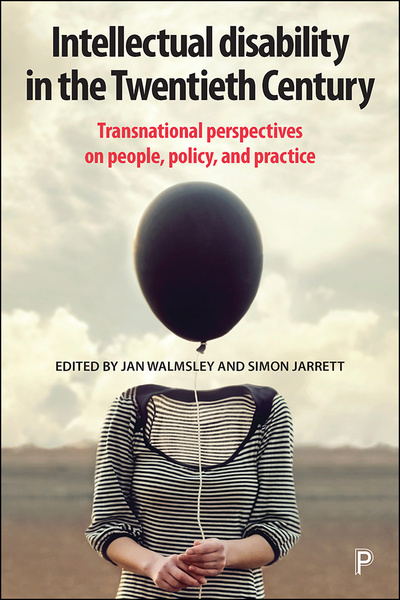You are here
- Home
- Resources and publications
- Publications
Publications
Research Group members have written a diverse range of social history of learning disability articles, which can be divided into:
- What we've found out: Findings on history, policy and practice in learning disability (PDF) and
- Methodology: Doing learning disability research (PDF)
Please refer to individual Research Group member profiles for more publications, as well as projects.
As well as articles and publications, the Research Group has also produced a number of books.
Books
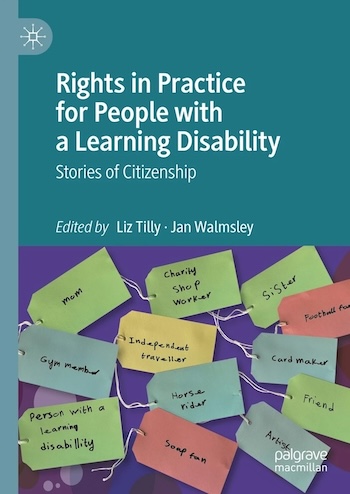 Rights in Practice for People with a Learning Disability
Rights in Practice for People with a Learning Disability
Liz Tilly and Jan Walmsley (eds), Rights in Practice for People with a Learning Disability. 2023
This book aims to raise awareness about the possibility of achieving the goals of the United Nations Convention on the Rights of Persons with Disabilities (UNCRPD), in order for all disabled people to enjoy the benefit of human rights. The stories of people who have been supported to enjoy their rights and their citizenship will enable readers to focus on how services and support can enable people with a learning disability to have their rights upheld, with an outcome of citizenship, independence and achievement. Despite the UNCRDP being in place since 2006, a significant number of learning disability service provider organisations and professionals in the UK are not aware of its existence. This book aims to bridge the gap between policy and practice to demonstrate the value of a human rights approach as the foundation for services and support for people with a learning disability.
Intellectual Disability in the Twentieth Century: Transnational Perspectives on People, Policy, and Practice
Jan Walmsley and Simon Jarrett (eds), Intellectual Disability in the Twentieth Century: Transnational Perspectives on People, Policy, and Practice. Bristol Policy Press, 2021
With contributions from distinguished authors in 14 countries across 5 continents, this book provides a unique transnational perspective on intellectual disability in the twentieth century. Each chapter outlines different policies and practices, and details real-life accounts from those living with intellectual disabilities to illustrate their impact of policies and practices on these people and their families.
Bringing together accounts of how intellectual disability was viewed, managed and experienced in countries across the globe, the book examines the origins and nature of contemporary attitudes, policy and practice and sheds light on the challenges of implementing the UN Convention on the Rights of Persons with Disabilities.
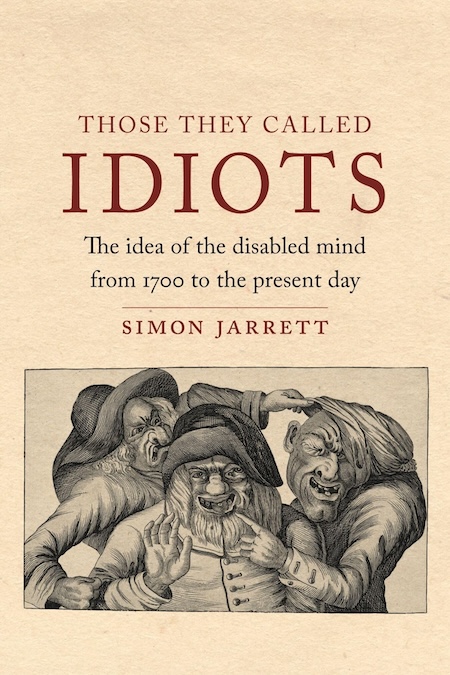
Those they called idiots: the idea of the disabled mind from 1700 to the present day
Those they called idiots: the idea of the disabled mind from 1700 to the present day by Simon Jarrett, Reaktion Books, 2020
Those They Called Idiots traces the little-known lives of people with learning disabilities from the communities of eighteenth-century England to the nineteenth-century asylum and care in today’s society. Using evidence from civil and criminal court-rooms, joke books, slang dictionaries, novels, art and caricature, it explores the explosive intermingling of ideas about intelligence and race, while bringing into sharp focus the lives of people often seen as the most marginalized in society.
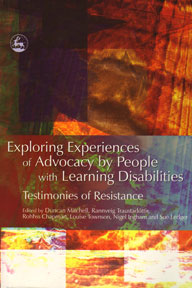
Exploring Experiences of Advocacy by People with Learning Disabilities: Testimonies of Resistance
Mitchell, D., Traustadóttir, R., Chapman, R., Townson, L., Ingham, N. and Ledger, S. (Eds) (2006) Exploring Experiences of Advocacy by People with Learning Disabilities: Testimonies of Resistance, London, Jessica Kingsley.
Exploring Experiences of Advocacy by People with Learning Disabilities charts the course through which people with learning disabilities have become increasingly able to direct their own lives as fully active members of their communities.
Accounts from the UK, Australia, Canada and Iceland consider both the individual pioneers of self-advocacy and the local and national groups that have been set up to work actively towards improved services for people with learning disabilities. The book also examines what self-advocacy means for these people and provides an overview of how opportunities and services have changed for them over the decades.
Many of the personal accounts, photographs and songs included in this book are accessible and encouraging to people with learning disabilities and inspiring reading for professionals who work with them, family members and community and government service providers.
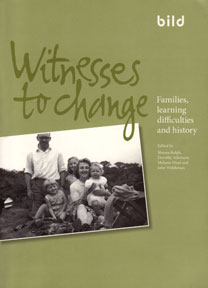
Witnesses to change: Families, learning difficulties and history
Atkinson, D., Nind, M., Rolph, S. and Welshman, J. (2005) Witnesses to change: Families, learning difficulties and history, Kidderminster, BILD Publications
The stories in Witnesses to change show how learning disabilities impacted on family life and relationships in the twentieth century, how challenges were approached and how families acted as advocates. It illustrates diversity and variety in family life, aiming to be inclusive and to challenge stereotypes. It highlights past mistakes as well as successes in managing learning disability services. And above all, it celebrates the lives of families who have contributed their stories.
Great strides have been made in the past decade in uncovering the history of learning disability using oral sources. The focus has been on recovering the voice of people with learning difficulties in order to correct a tendency towards the 'official' sources. But until now, families have not been seen as key contributors to this movement. This book seeks to alter that.
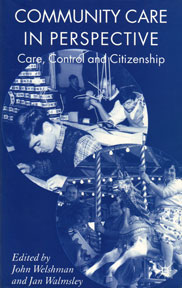
Community Care in Perspective: Care, Control, and Citizenship
Welshman, J. and Walmsley, J. (Eds) (2006) Community Care in Perspective: Care, Control and Citizenship, Basingstoke, Palgrave Macmillan.
Edited by John Welshman and Jan Walmsley, with chapters by Dorothy Atkinson, Rohhss Chapman, Kelley Johnson, Sue Ledger, Duncan Mitchell, Katherine Owen, Sheena Rolph, Tim Stainton, Liz Tilley, Jan Tøssebro and James W. Trent
This book tells the story of community care for people with learning difficulties between 1948 and 2001. It explores how policy changed from controlling people in institutions to promoting their rights to be equal citizens. Part 1 examines how ideas changed. Part 2 examines how policy and practice changed in the United Kingdom. Part 3 examines changes in the USA, Norway and Sweden, Canada and Australia and Part 4 tells people's own stories, showing how policy changes affected people's lives. It includes staff, voluntary organisations and families as well as people with learning difficulties.
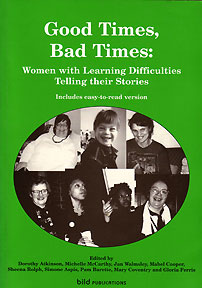
Good Times, Bad Times: Women with Learning Difficulties Telling their Stories
Atkinson, D., McCarthy, M., Walmsley, J. et al (2000) Good Times, Bad Times: Women with Learning Difficulties Telling their Stories, Kidderminster, BILD Publications
Women with a learning disability give voice to their thoughts and feelings on the topics that matter to them: work, relationships, children; what it means to be a woman with a learning disability. The book also provides a detailed account of the process by which women with and without a learning disability worked to support each other to make their voices heard.
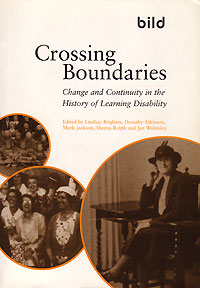
Crossing Boundaries: Change and Continuity in the History of Learning Disability
Brigham, L., Atkinson, D., Jackson, M., Rolph, S. and Walmsley, J. (2000) Crossing Boundaries: Change and Continuity in the History of Learning Disability, Kidderminster, BILD Publications
This book explores the history of learning disabilities through lively analysis and discussion from leading researchers and self-advocates.
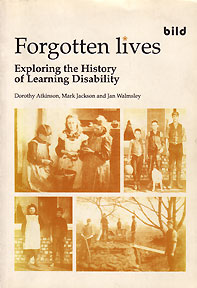
Forgotten lives: Exploring the History of Learning Disability
Atkinson, D., Jackson, M. and Walmsley, J. (1997) Forgotten lives: Exploring the History of Learning Disability, Kidderminster, BILD Publications
This book explores learning disability history from a variety of different perspectives - first hand accounts from people with a learning disability, documentary evidence, photographs and archive sources. The book also includes many practical suggestions as to how to go about researching learning disability history.
Contact us
About the Group
If you woud like to get in touch with the Social History of Learning Disability (SHLD) Research Group, please contact:
Liz Tilley
Chair of the Social History of Learning Disability (SHLD) Research Group
School of Health, Wellbeing and Social Care
Faculty of Wellbeing, Education and Language Studies
The Open University
Walton Hall
Milton Keynes
MK7 6AA
About the website
If you have any feedback or would like to report a problem with the website, please contact WELS-Research-Admin@open.ac.uk.
